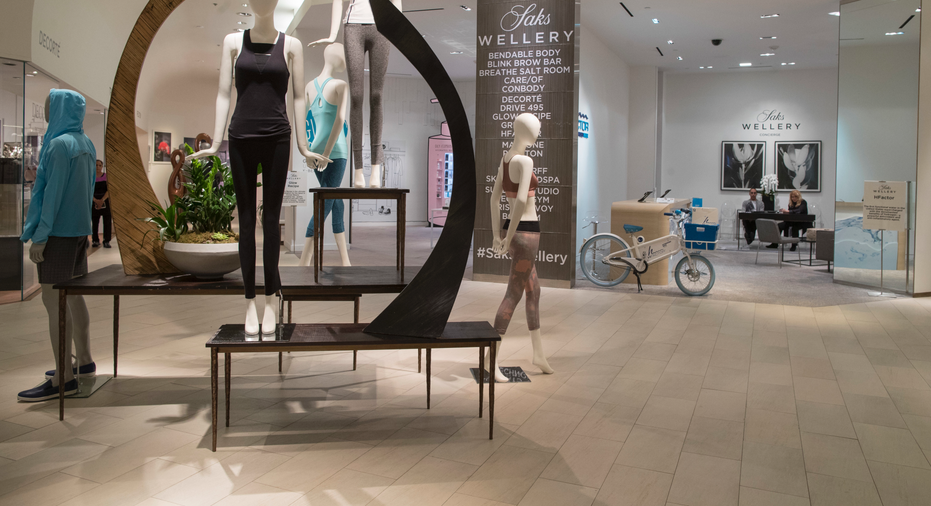Retailers want to work out your wallet _ and your body

NEW YORK – Stores like Saks and Urban Outfitters are looking to work out more than your wallet.
As retailers struggle to draw in shoppers who have migrated online, stores are seizing on one of the few bright spots in the industry — fitness and wellness — in hopes of engaging consumers. That means meditation lectures with Deepak Chopra at ABC Carpet & Home in New York, a yoga class at Bloomingdale's or a wellness getaway with Free People.
One recent Wednesday, a dozen women walked into Saks on Fifth Avenue, tucked their purses into lockers and got to work performing squat thrusts and jumping jack intervals during an hourlong boot camp. After class, they could browse through a rack of $85 Phat Buddha leggings and try Glow Recipe's $58 oil essence with cactus extract.
Mila Petrova, who wasn't part of the class that day but has attended other sessions at Saks, says it's the location more than the shopping that has drawn her — it's closer to her office. "I probably would have gone (to the workout) wherever they put it," she said.
The 27-year-old browsed the store only on the first night and hasn't made any purchases — she's usually rushing to the class from work and anxious to get home afterward. Still, though she's not a big shopper in general, she can see herself buying holidays gifts at Saks' Wellery section because she's already in the store.
Several stores have opened stand-alone locations with vast areas carved out for exercise classes and seminars. Urban Outfitters' five-story Space Ninety 8 in Brooklyn scheduled a chakra meditation and sound bath this month.
None of the chains are talking about how much the wellness business has increased sales — or if it has. It may be soon to tell. But while clothing stores struggle, U.S. activewear sales have increased. In 2016, they rose 11 percent over the previous year to nearly $46 billion, according to The NPD Group, a consumer tracking service, and are up from $36.9 billion in 2014. So it's no surprise retailers want to offer those customers more and keep them in the stores longer.
Saks' New York flagship has devoted an entire floor to the 16,000 square-foot wellness sanctuary that opened in May and offers fitness classes, a salt chamber and meditation alongside other merchandise. Celebrity fitness guru Tracy Anderson was the marquee name on opening night. After a sweat session, fitness aficionados can test the latest home gym equipment like a Peloton bike, get custom-fitted for golf clubs or get their nails done — a day's worth of self-care in one spot.
"We need to be their sanctuary, whether they need retail therapy or want to feel good about themselves," says Saks President Marc Metrick. "After a good workout it's a big rush, so it's great. We want people to feel good in our stores ... it doesn't always have to be because you bought a killer pair of shoes."
The Wellery is full circle for the upscale chain that constructed an indoor ski slope at its flagship store in 1935, and offered skiing lessons for a time as a novelty activity to bring customers in.
Before the wellness trend, department stores like Sears and J.C. Penney positioned themselves as destinations through photo studios and beauty salons. Penney has also had success with small Sephora locations inside stores.
The wellness trend taps into what analysts and retailers say is people's desire for experiences. Magdalena Kondej, head of apparel and footwear at Euromonitor, characterized it as "the prioritization of doing, seeing and feeling over having more stuff."
"No one comes to the store anymore to buy something. They can do that on the phone, in the cab, at home at night ... our stores have to become much more experiential," Metrick agreed.
Fitness retailers have also capitalized on this trend. Adidas opened its Runbase store in Berlin last year, which includes training facilities and a healthy restaurant. At Nike's SoHo store, consumers can test a pair of sneakers on the in-store basketball court, on a synthetic football field or on a treadmill that gives real-time feedback.
Stores are also focusing on selling nontoxic makeup, vitamins and powders for skin and hair. Free People, a bohemian apparel line popular among yogis, now sells wellness products. Some of the products and clothes are included in their retreats, like a five-night retreat at Glacier National Park that starts at $1,800.
Clean beauty queen and actress Gwyneth Paltrow had a partnership with Nordstrom this year for a series of pop-up shops. Paltrow's Goop brand curated the items, including non-toxic masks and serums, spiralizers for zucchini noodles, meditation pillows and yoga gear.
Bloomingdale's is also seeking to attract yogi dollars. It worked with wellness website Grokker for an online challenge, in-store events like yoga classes and a free subscription to Grokker for the month of May.
ABC Carpet & Home has offered seminars with meditation guru Gabrielle Bernstein. Thich Nhat Hanh, a Buddhist monk, led chanting with 100 fellow monks. Consumers can peruse sustainable and fair-trade jewelry, fitness apparel and maybe buy a tonic. It's part of an effort to draw like-minded consumers into the store and hopefully deepen their loyalty to the brand.
Bringing more consumers through the door — for whatever reason — can only help the stores, says NPD retail analyst Marshal Cohen.
"Impulse shopping happens more than double the amount in store than it does with an online purchase," he says.



















